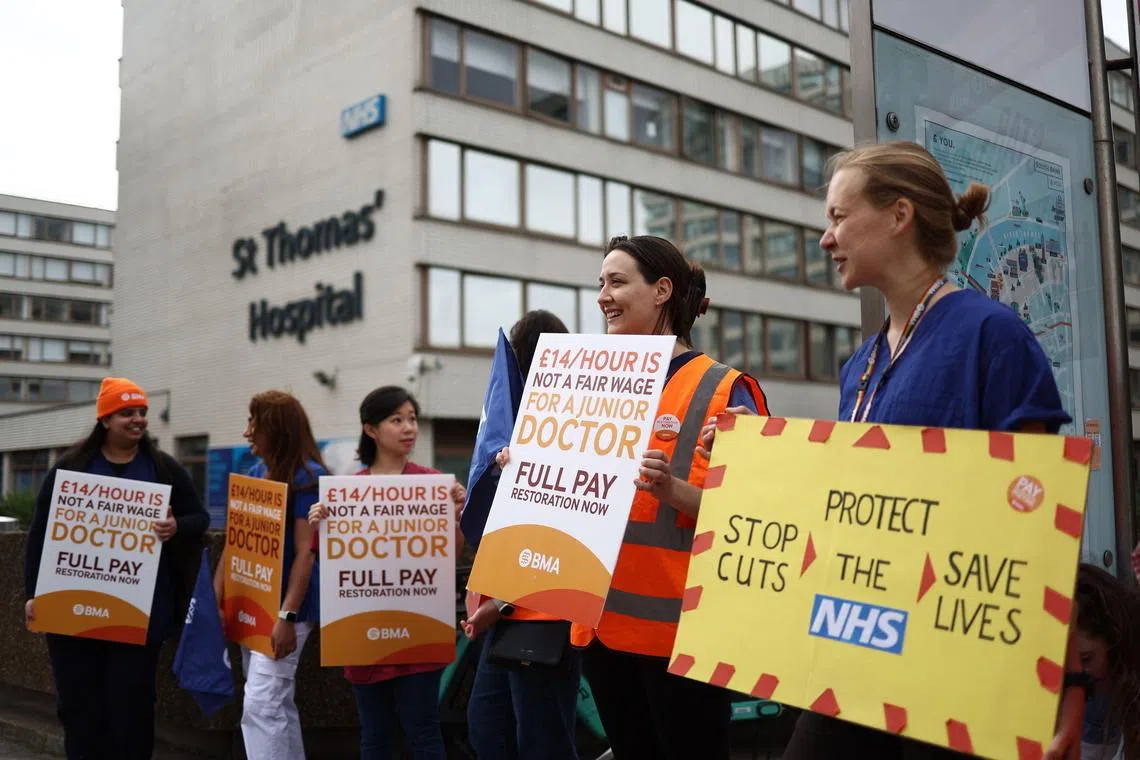Doctors in England start longest strike in NHS history
Sign up now: Get ST's newsletters delivered to your inbox

Junior doctors started a six-day walkout, in a major escalation of their long-running pay dispute with the British government.
PHOTO: AFP
LONDON – Hospital doctors in England on Jan 3 began their longest consecutive strike in the seven-decade history of Britain’s National Health Service (NHS).
Junior doctors – those below consultant level – started a six-day walkout, in a major escalation of their long-running pay dispute with the British government.
In a statement, the British Medical Association (BMA), which represents the doctors, urged the government to make a “credible” pay offer to end the strikes.
“Morale across the health service is at an all-time low... Many will be wondering if their chosen career is still worth pursuing – the government has the chance to show those doctors they still have a future working in this country,” the BMA said.
The industrial action comes at one of the busiest times of the year for the state-funded NHS, when it faces increased pressure from winter respiratory illnesses.
It also quickly follows a three-day strike held by doctors
The NHS said the latest stoppage, which could see up to half of the medical workforce on picket lines, would have “a significant impact on almost all routine care”.
“This January could be one of the most difficult starts to the year the NHS has ever faced,” said its national medical director, Dr Stephen Powis. The strike is due to end at 0700 GMT (3pm Singapore time) on Jan 9.
The BMA announced the walkout in December after a breakdown in talks with the government. The union said junior doctors have been offered a 3 per cent rise on top of the average 8.8 per cent increase they were given earlier in 2023.
It rejected the offer because the cash would be split unevenly across different doctor grades and would “still amount to pay cuts for many doctors”. The union seeks a 35 per cent improvement, which it says is needed to cover the impact of inflation over several years.
Junior doctors are qualified physicians, often with several years of experience, who work under the guidance of senior doctors and make up a large share of the medical community.
They have gone on strike at least seven times since March 2023.
Cumulatively, the NHS, which has provided healthcare free at the point of use since it was founded in 1948, has cancelled 1.2 million appointments since the 2023 strikes began.
Prime Minister Rishi Sunak and hospital leaders have criticised the action.
A spokesman for Mr Sunak said deals with other healthcare workers’ unions showed that the striking junior doctors were “outliers”.
“We have sought to come to a fair resolution – fair for the taxpayer, fair for hard-working doctors and health workers,” he told reporters on Jan 2.
“We have achieved that in the majority of cases... we are willing to have further discussions. But obviously the first thing to do is to stop striking.”
Health policy is a devolved matter for the administrations in Scotland, Wales and Northern Ireland, with the United Kingdom government overseeing England.
Junior doctors in Wales are due to walk out for 72 hours from Jan 15.
Those in Northern Ireland have voted for potential strike action.
Their Scottish counterparts have struck a deal with the government in Edinburgh.
The NHS typically sees a rise in the number of patients in hospital in the two weeks after Christmas, owing to people delaying seeking treatment to spend the festive season with loved ones.
The service is already facing huge backlogs in waiting times for appointments and surgery, blamed on treatment postponement during Covid-19 but also years of underfunding.
Sir Julian Hartley, chief executive of NHS Providers, which represents hospital groups in England, said the effect of the strikes on patients would be “significant”.
“The vast majority of planned operations, appointments, and so on, will have to be stood down,” he told BBC television.
Consultants will cover for junior doctors, and emergency and urgent care such as maternity and intensive care services will be operating.
But there are fears that Covid-19, flu and other seasonal conditions could also hit staffing. “We’re deeply concerned about the kind of impact over the coming days,” said Mr Hartley. AFP, REUTERS


